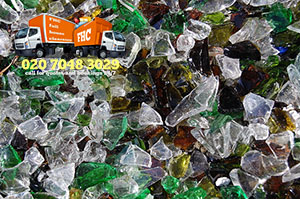The UK government is stepping up their efforts in trying to make people in Great Britain recycle more of their waste. At the moment, the UK’s rubbish pile is literally growing by the day. Figures suggest that about sixty percent of all waste generated in the UK can actually be recycled. England on the other hand, being the largest nation in the kingdom is recycling only about seventeen percent of all rubbish.
Switzerland, which is one of the top European performers in recycling rates, has developed an effective system for collection and recycling of rubbish. For instance, in every supermarket throughout the country, there are special bottle banks for collection and recycling of three different types of glass bottles – brown, green and clear. Every city, town and village in the country has free paper waste collection every month. The paper rubbish removal service includes anything from newspapers to phonebooks and cardboard.
 Green waste/garden rubbish is collected every two weeks. As long as the waste is neatly packed or bundled, there is no problem for it to be left outside prior to actual collection day. There are also other services like deposition of old batteries, exhausted motor oil etc. at special depots or in participating supermarkets.
Green waste/garden rubbish is collected every two weeks. As long as the waste is neatly packed or bundled, there is no problem for it to be left outside prior to actual collection day. There are also other services like deposition of old batteries, exhausted motor oil etc. at special depots or in participating supermarkets.
In the US, efforts are also being made as to increase the nation’s recycling rate and reduce the volumes of domestic and commercial property waste. Currently, the US recycles about twenty eight percent of all waste which is not a bad figure at all, considering the country’s recycling rate was twice as low fifteen years ago. The US has actually targeted specific types of rubbish for more intensive recycling. For instance, forty two percent of all paper is now recycled, forty percent of all plastic bottles, fifty percent of all aluminium beer and soda cans are now recycled, fifty seven percent of all steel packaging, and fifty two percent of all electrical appliances are now subject to recycling.
Another European country that deserves two thumbs up for recycling efforts is Denmark. The Danish state is one of the EU’s greenest countries. When it comes to rubbish removal and waste management the Danes set the benchmark. In a nutshell, the underlying philosophy of Denmark’s recycling system is that waste is not just waste but also a resource. A consecutive number of Denmark’s governments have consistently kept up the same tough waste and rubbish management policies which are obviously paying off. Ultimately though, despite government regulations it is up to local authorities to determine what type of rubbish to collect and how to manage it as long as their methods are not in breach of government imposed waste management policies.
Germany is another EU country which takes their rubbish separation and recycling very seriously. Besides being a proven champion in large scale environmental protection policies, Germany is also big on rubbish separation. Rubbish separation has become somewhat of a mania. In Berlin for instance, households and businesses separate their rubbish at least five ways. The five bins provided by local councils are colour coded to avoid any confusion.



